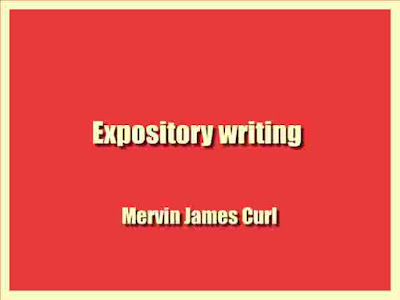Expository writing Excerpt: "The Anglo-Saxons," Emerson said, "are the hands of the world " — they, more than any other...
Expository writing
Excerpt:"The Anglo-Saxons," Emerson said, "are the hands of the world " — they, more than any other people, turn the wheels of the world, do its work, keep things moving. Without angering to quarrel with Emerson, or to justify him, we may safely assert that Expository Writing is the hands of literature.
In a world which man even as yet only slightly understands, surrounded as he is by his fellows who constantly baffle his intelligence, and shut up within the riddle of himself. Exposition attempts to explain, to make clear, to tear away the clouds of mystery and ignorance. Exposition attempts to answer the endless curiosity of man. "What is this?" a man asks, of things and of ideas. "Who are you?" he addresses to his fellows.
"How did this originate, what caused it, where is it going, what will it do, how is it operated?" he repeats from birth to grave. Perhaps the most interesting question in the world is the never-ending "What does this mean to me, how does it affect me, how can I use it?" These are the questions — and there are more of them — which Exposition tries to answer. Obviously, in making the answers the writing will often be garbed in the sack suit of business, will sometimes roU up its sleeves, will pull on the overalls or tie the apron.
Then it may explain the workings of a machine, the wonders of a printing press, or may show the mysteries of Congressional action, or the organization of a department store, or even tell how to bake a lemon pie. But it may also appear in the opulence of evening costume, and criticize the ensemble of an orchestra, discuss the diplomacy of Europe, address us in appreciation of the Arts.
It may assume the fine informality of the fireside and give us of its most delightful charms in discussing the joys of living and learning, the whimsicalities of the world. In any case, it will be answering the endless curiosity of man. It would not be rash to say that more expository thinking is done than any other kind of mental activity.
The child who dismantles a clock to find its secret is doing expository thinking; the official, of however complicated a business, who ponders ways and means, is trying to satisfy his business curiosity; the artist who studies the effect of balance, of light and shade, of exclusion or inclusion, is thinking in ex- position; politicians are ceaselessly active in explaining to themselves how they may, and to their constituents how they did.
We cannot escape Exposition. The question then arises, since this form of writing is always with us how can we make it effective and enjoyable? All writing should be interesting; all really effective writing does interest. It may not be required that every reader be interested in every bit of writing — that would be too much to hope for in a world where sympathies are unfortunately so restricted.
To peruse a directory of Bangkok, if one has no possible acquaintance in that city, might become tedious, though one might draw pleasure from the queer names and the suggestions of romance. But if one has a lost friend somewhere in New York, and hopes that the directory will achieve discovery, the bulky and endless volume immediately takes on the greatest interest. Lincoln, driven at length to write a recommendation for a book, to escape the importunities of an agent, wisely, whimsically, wrote, "This is just the right kind of book for anyone who desires just this kind of book."
Wide though his sympathies were, he recognized that not everyone enjoys everything. The problem of the writer of exposition is to make as wide an appeal as he can. Interest in reading is of two kinds: satisfaction and stimulation. And each of these may be either intellectual or emotional or both.
The interest of satisfaction largely arises when the questions that the reader brings with him to his reading are answered. A reader who desires to know what is done with the by-products in a creamery, where the skim milk goes to, will be satisfied — and interested — when he learns the complete list of uses, among them the fact that skim milk is largely made into the white buttons that make our underclothing habitable.
The reader who leaves an article about these by-products with the feeling that he has been only half told is sure to be dissatisfied, and therefore uninterested. In the same way, when a reader picks up an article or a book with the desire to be thrilled with romance or wonder, to be taken for the time away from the business of the world, to be wrenched with pity for suffering or with admiration for achievement — in other words when a reader brings a hungry emotion to his reading — if he finds satisfaction, he is interested.
the book details : Author: Mervin James Curl Publication date: 1919 Company: Boston New York [etc.] Houghton Mifflin company
Download 8.3 M
Contents:
I. The Nature Am) Material of Exposition ... 1
II. How TO Write Exposition 11
III. Definition .^ . 73
IV. Analysis 113
V. Mechanisms, Processes, and Organizations. .157
VI. Criticism 190
VII. The Informal Essay 231
VIII. Expository Biography 257
IX. The Gathering of Material for Writing . . . 297
Index. 305
Index. 305
Download 8.3 M










